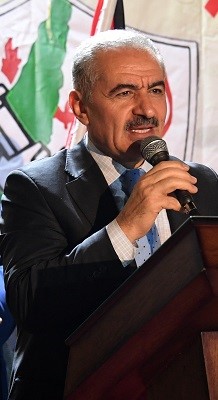Prime Minister Mohammad Shtayyeh reinstated today evening a set of restrictions after experiencing a surge of coronavirus infections.
The premier ordered stricter measures in an effort to contain the outbreak of the COVID-19 pandemic in Palestine, including a five-day lockdown of Hebron Governorate, the worst-hit district of the West Bank.
Speaking at a press conference in Ramallah, Shtayyeh said movement in and out of Hebron will be barred for five days with the exception of cargo trucks, in order to enable medical teams to control the spread of the disease. He added that only pharmacies, bakery shops, and factories will be allowed to work during the upcoming five days, provided that all the health and safety requirements are met.
In addition, he ordered a 48-hour complete shutdown of Nablus city to enable the medical teams to trace contacts of every newly diagnosed case of COVID-19.
The Prime Minister also declared an immediate ban on weddings and graduation parties, mourning houses and all forms of public gatherings in all West Bank governorates.
He demanded all public and private facilities, factories and stores of all kinds in addition to cafes and restaurants, to adhere to the conditions of public safety, warning breachers of closure and being brought to justice.
Beginning tomorrow, Shtayyeh said the cabinet ministers will be asked to reduce the movement of their employees between the governorates unless necessary, with the exception of the employees from Hebron who will be required to work inside the governorate.
The Prime Minister said a full closure will be imposed on every village, camp, neighborhood, or city where the coronavirus is spread and in a manner that poses a risk to the entire population.
Shtayyeh warned that those who insist on violating the quarantine conditions and putting others at risk of being infected or dying from the virus will be brought to justice for trial.
“There is no longer any room for tolerance in the matter. The safety procedures are very simple: compliance with COVID-19 social distancing orders, and the use of a facemask in markets, public places, workplace and others. This is a compulsory measure that all citizens have to abide by,” he stated.
He maintained that work in Israeli settlements shall be strictly forbidden during the pandemic, and that stricter measures will be imposed in the event of non-compliance.
Shtayyeh said the emergency committees will be activated in various villages and communities to support the work of the security services, especially in hard-to-reach areas.



